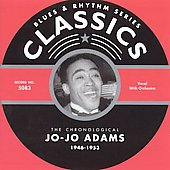Elevate Your Saturday Night with the The Sepia Frank Sinatra!

Dig this nice little 1947 ditty from Jump Blues King Jo Jo Adams. After just one listen to When I'm In My Tea I think you'll agree that this should be a permanent addition to your official Saturday night mix.
Here's a little Jo Jo history:
Born circa 1918, Alabama
Died 27 Februay, 1988, Chicago, Illinois
"I started playing the blues when I saw a man standing on the stage and he was getting big money. He had a red pocket hand'chief around his neck and coveralls and I said, 'That's not the way it's supposed to go'. I introduced color to the stage. My tailor-made tails that were 55 inches long - when I spun around you could shoot dice on them!"
Seldom remembered today among the greats of jump blues, Jo Jo Adams was once quite a celebrity in the 1940s and 1950s Chicago music and entertainment circle. A comedian/singer/dancer/emcee and leader of a successful revue, the few remaining images and film clips we have of the man (for example, his performances from the 1949 William Alexander short "Burlesque In Harlem"), shows a slim, dapper, Cab Calloway-like performer, an impression borne out by his jazzy recordings such as When I'm In My Tea.
Once billed as "The Sepia Frank Sinatra" (more for his build and sartorial elegance than his vocal style), Jo Jo Adams was born in Alabama around 1918. Little is known of his early life, except that he sang with a quartet called the Big Four Jubilee singers, and that he was on Chicago's South Side by 1945, playing venues such as the Ritz Show Lounge, and first recorded in early 1946 with guitarist Freddie Williams' band for Williams' own Melody Lane Record Shop label.
Within a few weeks, Melody Lane had become Hy-Tone Records and the two Adams releases were reissued on the new label. During the summer of 1946, Adams was in Los Angeles, recording for Aladdin Records with the Maxwell Davis All Stars and appearing with Clifford Scott at the Hideaway Club, however, by the end of the year, he was back in Chicago recording for Hy-Tone, this time with veteran guitarist Floyd Smith's Combo (Smith had been famous for his influential 1939 hit Floyd's Guitar Blues recorded with Andy Kirk's Orchestra and had only just left the Kirk band at the time of his Hy-Tone session).
In July 1947, "Doctor Jo Jo" as he was sometimes billed, recorded a four track session for Aristocrat Records with Tom Archia's All Stars, and in early 1948 he was recalled by Archia to sing the wonderful, two-part Cabbage Head - an updating of the ancient British ballad "Our Gudeman"(aka Seven Nights Drunk). Apart from his welcome appearance in the aforementioned musical short "Burlesque In Harlem" - in which he performs the risqué I Like To Hucklebuck before displaying his terpsichorean skill with an exotic dancer - Adams appears to have disappeared from the recording scene for a full four years (he is known to have joined Memphis Slim's Houserockers as a singer briefly in 1950), returning in November 1952 to cut six sides for Art Sheridan's Chance Records with trumpeter Melvin Moore's Orchestra.
His last known release was issued the following year on Al Benson's Parrot label, backed by a small unit headed by drummer Red Saunders and arranged by Sun Ra. Although the recordings were sparse, Adams appeared often in the early 1950s at the Flame Show Bar with his own revue "The Jo Jo Show".
He is listed as being part of a couple of rock 'n' roll revues at the Trianon Ballroom and the Regal Theatre in 1955 and also at a club called Budland in late 1958, and then seems to have vanished into obscurity for the last 30 years of his life (Living Blues reported that he would still occasionally play in his neighbourhood of 64th and Maryland).
He died in Chicago on 27th February 1988.
Thanks to Dave Penny and his Living Blues interview with Jo Jo.








